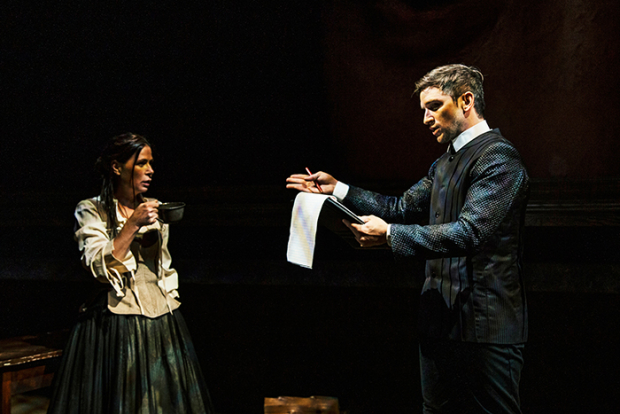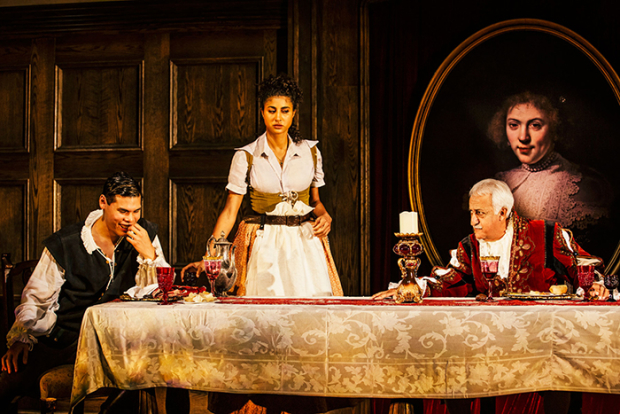Witch Goes Medieval on Modern Times

(© Jeff Lorch)
Witch, receiving its West Coast premiere at the Geffen Playhouse, explores sexual politics and humanity's bloodlust for power. Loosely based on William Rowley, Thomas Dekker, and John Ford's 1621 play The Witch of Edmonton, this one-act battle of the sexes proves that little in human nature has changed since the 1600s.
At sometime in the 17th century, a town has become bewitched by the Devil (Evan Jonigkeit) — a junior executive-level devil, to be precise. With the ease of an Amway multilevel marketing manager, the Devil, named Scratch, convinces the townspeople, including a disgruntled young aristocrat (Will Von Vogt) and an interloper who has become a rival for his father's (Ruy Iskandar) love, to sell their souls and fulfill their destinies.
Scratch then finds the one person he expects to be the easiest soul to scoop — a lonely outcast characterized as a witch by the town. He offers this woman, Elizabeth (Maura Tierney), revenge against everyone who gossiped about her and castigated her. But Elizabeth has powers that Scratch cannot comprehend, and he finds himself lost in her conjuring.
Silverman has a wonderful ear for dialogue and for building character through soliloquies that don't feel like antiquated theatrical devices. The characters are tropes — the clueless castle owner, the fey son, the pauper trying to steal a legacy, the abandoned wife, and the old crone — but Silverman pays such close attention to each's motives and emotions behind the actions that every character has nuances that catch the audience off guard.
By having her characters speak in modern colloquialisms, Silverman clearly draws parallels between the days of witch trials to the 21st century and finds that humanity has grown little over the ages. People are still unnecessarily cruel to each other.

(© Jeff Lorch)
Director Marti Lyons separates the diverse class systems with two performance spaces: one on the platform that, when utilized, juts out past the proscenium to the audience; and one on the ground, among the sand and dirt. She stages several steamy, seductive scenes that juxtapose feelings of tenderness and hostility at the same time.
The cast is exemplary. Tierney seems less at home on the stage than the small screen, which can be recognized by the unnatural stiffness of her hand movements, but she exudes intelligence and wisdom in her portrayal. Her chemistry with Jonigkeit is electric, and even the most commonplace dialogue feels like foreplay. Jonigkeit turns the devil into a lackey, one spirited about his job, but less competent than even he realizes. Iskandar is bombastic as the greedy young man who wants everything that everyone else has. With a broad smile and stretched-out posture, he embodies someone who feels he's superior to all others. Menacing, particularly when gay-bashing the rightful heir to the fortune he craves, Iskandar is spellbinding.
As the befuddled nobleman Sir Arthur Banks, Brian George has a revealing monologue that gives his character shading and turns him into the epitome of every underqualified parent. Von Vogt is hilarious and heartbreaking as the spoiled boy who just wants respect from his father. He does an interpretive dance, choreographed by Jessica Lee Keller, that reflects the consternation of someone mocked by society for his femininity. Vella Lovell, as the woman spurned by power-mad men, digs in her heels and demands to be seen.
Keith Parham's lighting includes a subtle yellow-striped pattern that projects on the characters' white clothing, making them look imprisoned. Mikhail Fiksel's music haunts the ear with the medieval lilt of lutes. Steve Rankin's fight choreography combines hostile and sexual aggression to stage a combat that could be a sex act. Dane Laffrey's set includes a melancholy painting of a young 16th-century woman with scars on her head staring blankly at the characters when the curtain is down, separating castle from village. Those eyes glow in the dark during blackouts with a celestial light.
Witch brings cackles and spells of hilarity throughout, but it can be quite existential and profound. It offers no answers, but definitely asks the right questions.










